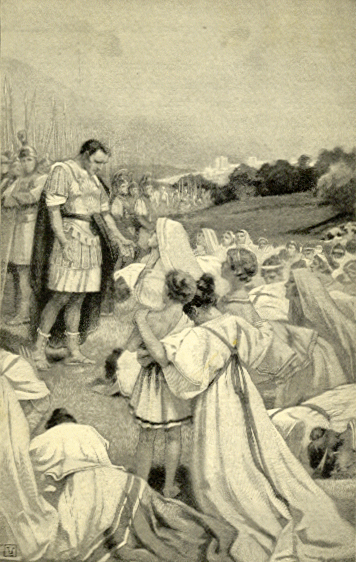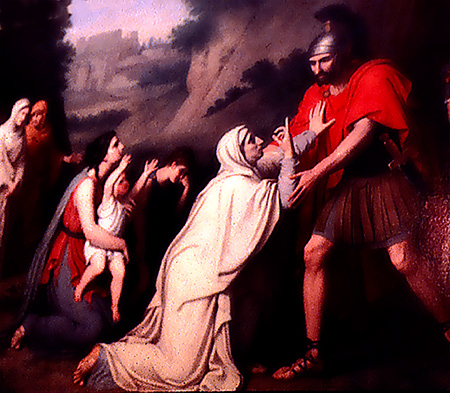The story of Gnaeus Marcius Coriolanus must have once been widely known amongst the Roman people. It tells of a great commander who was exiled and then betrayed his previous hometown and waged war against it.
Youth
During his earlier life, Ganeus Marcius trained himself in the art of war and use of weapons:
| " | And so Marcius, who was by nature exceedingly fond of warlike feats, began at once from his very boyhood to handle arms. Since he thought that adventitious weapons were of little avail as it did not have their natural and native armour developed and prepared for service, he so practised himself in every sort of combat that he was not only nimble of foot, but had also such a weight in grapplings and wrestlings that an enemy found it hard to extricate himself. At any rate, those who, from time to time, contended with him in feats of courage and valour laid the blame for their inferiority upon his strength of body, which was inflexible and shrank from no hardship. " |
| -- Plutarch, the Life of Coriolanus |
In his first campaign, which was alongside Tarquinius against Rome, he saved the life of a fellow soldier and was noted for that (he gained the civic crown). During the following years, he participated in other campaigns and soon became a well-known person.
Coriolanus
The Volsci city of Corioli was a threatening enemy of Rome and the Senate issued orders for the army to march upon it. Corioli called for allies and battle broke out before the city walls, but Gnaeus Marcius took a few of his friends and assailed the enemy with great valour and success so that they retreated back to the city as fast as they could.
 | Coriolanus stands before Rome |
| " | Among the Volscians, with whom the Romans were at war, the city of Corioli took highest rank. When, therefore, Cominius the consul had invested this place, the rest of the Volscians, fearing for its safety, came to its aid against the Romans from all parts, designing to give them battle in front of the city and to attack them on both sides. Thereupon Cominius divided his forces, going forth himself to meet the Volscians who were coming up outside, and leaving Titus Lartius, one of the bravest Romans of his day, in charge of the siege. Then the men of Corioli, despising the forces that were left, sallied out against them, overcame them in battle at first, and pursued the Romans to their camp. At this point Marcius darted out with a small band, and after slaying those who came to close quarters and bringing the rest of the assailants to a halt, called the Romans back to the fight with loud cries. For he had, as Cato thought a soldier should have, not only a vigour of stroke, but a voice and look which made him a fearful man for a foe to encounter, and hard to withstand. Many of his men rallied to support him, and the enemy withdrew in terror. With this, however, he was not satisfied, but followed hard upon them, and drove them at last in headlong flight, up to the gate of their city. There, although he saw the Romans turning back from the pursuit, now that many missiles from the walls were reaching them, and although not a man of them dared to think of bursting into the city along with the fugitives, full as it was of enemies in arms, he nevertheless took his stand, and exhorted and encouraged them to the exploit, crying out that fortune had opened the city for the pursuers rather than for the pursued. Only a few were willing to follow him, but he pushed his way through the enemy, leaped against the gate, and burst in along with them, no man daring to oppose him at first or resist him. Then, however, when the citizens saw that few of the enemy all told were inside, they rallied and attacked them. Enveloped thus by friends and foes alike, Marcius is said to have waged a combat in the city which, for prowess of arm, speed of foot, and daring of soul, passes all belief; he overwhelmed all whom he assailed, driving some to the remotest parts of the city, while others gave up the struggle and threw down their arms. Thus he made it abundantly safe for Lartius to lead up the Romans who were outside. " |
| -- Plutarch, the Life of Coriolanus |
| " | When the multitude had ceased shouting their applause, Cominius took up the word again and said: "Ye cannot, indeed, my fellow-soldiers, force these gifts of yours upon the man, when he does not accept them and is unwilling to take them; but there is a gift which he cannot refuse when it is offered. Let us give him this gift, and pass a vote that he be surnamed Coriolanus, unless, indeed, before such act of ours, his exploit has itself given him this name." Thus came his third name of Coriolanus. " |
| -- Plutarch, the Life of Coriolanus |
So it happened that he was named Coriolanus and his fame rose even higher in the city. After that, he was elected a consul and his life continued as a prominent man in Rome.
Exodus
He was, however, soon exiled due to charges that the people presented against him:
| " | Accordingly, the greater part of the people showed signs of relenting, and it was evident, from their decorous and sober attention, that they were on the way to be controlled and won over. Then the tribunes rose and declared that since the senate was now acting soberly, the people in their turn would make such concessions as were fair and honourable. They insisted, however, that Marcius should make answer to the following charges: Could he deny that he had instigated the senate to violate the constitution and abrogate the powers of the people? When summoned to appear before them, had he not refused? And finally, by insulting and beating the aediles in the forum, had he not done all in his power to incite the citizens to arms and bring about a civil war? They made this demand with a desire either that Marcius should be publicly humiliated, if, contrary to his nature, he curbed his haughty spirit and sued for the favour of the people; or, if he yielded to his natural promptings, that he should do something which would justify their wrath against him and make it implacable. The latter was what they the rather expected, and they rightly estimated the man's character. " |
| -- Plutarch, the Life of Coriolanus |
He defended himself as he could, but he was still exiled from the city of Rome. He then went to the city of Antium, a city of the Volsci, where there lived a man whose name was Tullus Aufidius[1] and who was a dire enemy of Rome. He had been unable to send his companions into battle, however, Coriolanus offered his services and Tullus accepted.
Ludi Megalenses
 | Venturia at the feet of Coriolanus |
At this time, Rome was holding the games of Ludi Megalenses in honour of Magna Mater and Jupiter. However, the games were pretty miserable. Then, a citizen went to the Consuls of Rome and said that he had a dream where Jupiter told him that, if no greater games would be held, Rome would suffer a great disaster. The Consuls immediately wished to organize larger games – now they invited men and women from all nearby towns and cities, besides the Roman citizens.
Attius Tullius also came and said that his countrymen were planning to take over Rome during the games and that he wished to remain innocent and leave earlier. The Romans, therefore, told all Volsci to leave the city and forbid anyone from entering. Attius (and Coriolanus) then urged everyone to take revenge against that insolence. The Volsci quickly drew weapons and were soon camped under the gates of Rome.
Feat of Coriolanus
The gates of Rome were closed and as Romans knew how dangerous Coriolanus was, they wished to make peace with him. They sent a messenger, but he was sent back to Rome. Then, the Romans sent priests in their official robes, but Coriolanus didn’t accept them.
At last, the Romans sent women, including the wife and mother of Coriolanus – Volumnia and Veturia (respectively). Coriolanus wished to embrace his mother, but his mother said: ’Before I embrace you, I have to know whether you are here as an enemy or son. When you approached Rome, didn’t you think that between these walls were your home and your gods, your wife, mother and children?’
This made Coriolanus soften and he embraced his kin and sent them back to Rome. Coriolanus aborted the assault upon Rome and disappeared forever from the Roman populace.
Death
In Antium, he, however, called for a general assembly that would discuss his fate, for he had agreed to put down the office of general if the people so wished. Tullus, however, had become greedy and wished the place for himself – he was frightened the people would not care for the peace with Rome and, therefore, he, along with a few conspirators, assaulted Coriolanus before all others and killed him:
| " | Accordingly, the conspirators decided to make no more delay, and not to test the feelings of the multitude; but the boldest of them, crying out that the Volscians must not listen to the traitor, nor suffer him to retain his command and play the tyrant among them, fell upon him in a body and slew him, and no man present offered to defend him. However, that the deed was not wrought with the approval of the majority of the Volscians, was seen at once from their coming out of their cities in concourse to his body, to which they gave honourable burial, adorning his tomb with arms and spoils, as that of a chieftain and general. " |
| -- Plutarch, the Life of Coriolanus |
Sources
Plutarch, ’the Life of Coriolanus’
Leo Hjortso, ’Rooma jumalad ja kangelased’
References and Notes:- ^ Elsewhere also written as ’Attius Tullus’.
|



